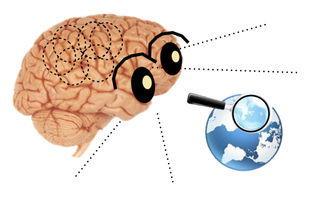Neuroscience
Why You Need to Take a Break From Criticism
When you step back and take a different view, the whole world looks better.
Posted April 4, 2014
When you look at the world around you, it's easy to see flaws.
Even when you don't mean to be critical, problems and targets just pop out at you. This seems like proof that things really are that bad. You don't realize how your mind creates this reality by zooming in on details that fit your neural template—and skimming over the rest of the story. But you can take a break from this negativity once you know how your mind creates it. You can even notice the good things around you when you can detach your critical lens.
So why is it so hard to let the sun shine in?
Critical ad Absurdum
The people around me say things are bad and they're only getting worse: Our leaders are flawed, our culture is lacking, our health is failing, our species is endangered, our planet is dying, the last century was the worst ever, and the new millennium is shaping up to be just as bad.
It starts to seem like some people criticize just to keep in practice. When they go out for dinner and a movie, they look for flaws not only in the food and the film, but the systems that created them. Reality disappoints as their brains skillfully compare it to their expectations. Disappointment triggers cortisol, the stress hormone, which feeds the habit. The electricity in our brain flows like water in a storm, finding the path of least resistance. When you see familiar problems, your brain lights up effortlessly because past cortisol flows paved those neural pathways.
Here are some of the ways we become wired to criticize:
- Criticizing builds social bonds. People often connect by focusing on common grievances. You may feel like you must embrace the shared sense of threat to avoid being excluded. You don't notice the neural template that drives these thoughts because you interact with people who share it. You feel like you're just seeing the truth.
- Criticizing society makes you feel like an intelligent, even caring person. Schools typically train students to use “critical theory” to focus their minds on finding flaws in “the system.” If you adopt this thought habit, you can thrive in academia. If you don’t, you’re considered a lightweight.
- The news keeps you focused on problems and crises near and far. Journalists and TV producers are constantly scanning the world for evidence of danger. They dwell on dangers for days on end to keep you tuning in for an update. You keep building your brain's sense of danger when you expose yourself to "the" news.
You can train your brain to focus on a different slice of life. But it's not easy because the electricity in your brain tends to flow into the deepest grooves. It takes effort to activate new circuits in our brain, which is why so many people fall into the habit of repeating their usual critiques and ignoring the rest of the story. If this is your routine, you can end up feeling bad without realizing that you have created the feeling yourself. Fortunately, if you choose to focus on positives instead of negatives, new pathways start building!
Take a Break
I'm not saying you should focus on butterflies, puppies and rainbows. I'm saying you have the power to take off your critical lens and see something new. You will be amazed at the new observations that strike you when your attention is not preoccupied with the same old gripes.
This can be harder than you expect. It takes a lot of energy for your brain to activate neurons that are not already connected. And we tend to feel unsafe when we depart from old paths because past experience with rewards and pain created those paths. When you leave them, it feels like you don't know how to navigate toward rewards and away from pain. In practical terms:
- Your social bonds may feel at risk if you stop reacting to the "concerns" of those around you.
- You fear you'll look weak and foolish if you stop railing against "the system."
- You worry that important issues will take you by surprise if you stop watching "the news" for the latest warnings.
How do you dare take a break with all that internal pressure?
At first, it may feel more like going through withdrawal. You may feel an urgent need to criticize the cable guy, just to feel like you're on top of your game. But if you have the courage to live with the discomfort, sunnier information will shine in when you stop filtering it out. You will begin to realize how many of the flaws you saw around you were magnified by your own brain.
You can go back to criticizing when there's a real need, but you will always know how to take a break. And once you start letting the sun shine in, you'll realize that all of your critiquing has not really been helping you.
My book, The Science of Positivity: Stop Negative Thought Patterns By Changing Your Brain Chemistry, has a detailed plan for taking such a break.





